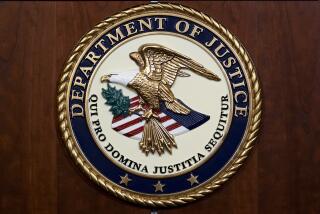Defining victory
LIKE THE WAR IN LEBANON ITSELF, the war of words over who “won” the bloody monthlong conflict cries out for a cease-fire. The Bush administration appears to have recognized this, if belatedly, with its tempered rhetoric in the aftermath of the United Nations resolution that ended the fighting.
On Monday, the president spun the U.N. Security Council resolution on Lebanon as a victory for Israel and taunted Hezbollah: “How can you claim victory,” he asked, “when, at one time, you were a state within a state, safe within southern Lebanon, and now you’re going to be replaced by a Lebanese army and an international force?”
It wasn’t until Wednesday that Secretary of State Condoleezza Rice turned down the volume. In an interview with USA Today, Rice emphasized that an expanded U.N. peacekeeping force would not “physically disarm” Hezbollah fighters, a task the United States believes eventually will be discharged by Lebanon. Rice also offered a more judicious verdict on how the conflict has affected Hezbollah’s standing with the Lebanese people. Its political advantage, she said, would be “very short-lived” once the Lebanese realize that Hezbollah was ultimately responsible for the devastation caused by Israel’s attacks.
Rice’s rhetorical retreat was an accommodation to reality. Far from being shunned by the Lebanese people, Hezbollah seems to have improved its image because of its resistance to Israel and its conspicuous plans to rebuild southern Lebanon with aid from Iran. Basking in that popular support, Hezbollah has insisted that the Lebanese government go slow in disarming it. On Wednesday, White House Press Secretary Tony Snow acknowledged that “it’s going to take some time” for disarmament to occur.
A delay in confiscating Hezbollah’s weapons need not be fatal to peace if Lebanese and international troops quickly gain control of southern Lebanon, and Hezbollah fighters move north to a point where they can’t threaten Israel.
There are signs of progress. On Thursday, Lebanese troops began arriving in southern Lebanon, and they may soon be joined by the first wave of an expanded U.N. force. Meanwhile, Israeli forces have begun withdrawing from Lebanon.
Eventually, however, Hezbollah must be convincingly disarmed so that Lebanon, in the words of the U.N. resolution, has a “monopoly over the use of force ... on its entire territory.” Achieving that objective could require engaging Hezbollah’s patrons in Iran and Syria, a delicate diplomatic task only hindered by gloating on both sides about “victory.”
This war of words isn’t as dangerous as the real war that thankfully has come to a halt in Lebanon. But, as the Bush administration surely realizes, escalating rhetoric carries its own dangers.
More to Read
Sign up for Essential California
The most important California stories and recommendations in your inbox every morning.
You may occasionally receive promotional content from the Los Angeles Times.









